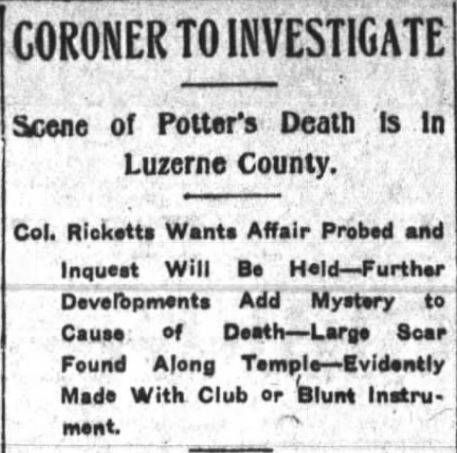Click here to subscribe today or Login.
Territorial boundaries delayed an investigation into the 1905 drowning death of J. Arthur Potter, whose body was recovered from Mud Pond, once located in today’s Ricketts Glen State Park.
Witnesses to the drowning on Aug. 16, 1905, had to walk into Luzerne County for a coroner’s inquest held at night in woods illuminated by multiple lanterns.
Over time, the county boundaries changed placing Mud Pond in Sullivan County. Mud Pond was merged into Lake Jean in 1950 when a large, earthen dam was built to create a 245-acre lake at the state park.
Potter was employed as a foreman for Col. R. Bruce Ricketts, who purchased and timbered thousands of acres of land in Luzerne, Sullivan, Columbia and Wyoming counties following the Civil War.
When Potter’s body was found, Ricketts used his powerful influence, “to keep his word and sift this mysterious incident to the very bottom,” the Wilkes-Barre Record reported Aug. 25, 1905.
A week after Potter’s body was recovered, Luzerne County Coroner Daniel Webster Dodson reacted.
“Coroner Dodson did not take action before yesterday because he thought that the affair had occurred in Wyoming or Sullivan County. He was notified that Mud Pond is located in Luzerne County,” the Record reported Aug. 16, 1905.
Dodson held a coroner’s inquest to determine the cause of death.
When Potter’s body was recovered, he had a large wound to his face giving an appearance he was struck with a club or bat.
Dodson and Assistant District Attorney Abraham Salsburg traveled to northwest Luzerne County and crossed into Sullivan County to serve witnesses with subpoenas ordering them to appear at the coroner’s inquest.
“They arrived at Ricketts at 5:30 and had supper, after which they had to walk about three miles in order to get on Luzerne County soil to hold the inquest. It was after 7 p.m. before they reached the place that had been selected for holding the inquest. This spot was right out in the woods and the session was conducted in the open air with the aid of many lanterns,” the Record reported Aug. 28, 1905.
The six men on the coroner’s jury determined two men from Kidder Street, Wilkes-Barre, Thomas J. Georgi and Harold Kensey, both 23, were responsible for Potter’s death.
About 200 people from the area gathered to witness the coroner’s inquest.
“These men were bitter against Georgi and Kensey and made all sorts of threatening remarks and for a time it looked dangerous and Coroner Dodson was greatly alarmed lest the men should take the law into their own hands,” reported the Record.
The Wilkes-Barre Record reported Georgi and Kensey paid Potter $2 to row them across Mud Pond to fish. As Potter rowed the boat, the three men argued about a bottle of liquor as either Georgi or Kensey struck Potter in the head before throwing his body in the water.
In their defense, Georgi and Kensey claimed they reached the other side of Mud Pond and as they looked back, Potter had fallen into the water and was clinging to the overturn boat. Georgi and Kensey did not tell anyone, and walked 12 miles to Harveyville instead of returning to a lumberjack camp at Lake Ganoga to inform Potter’s friends.
Dodson referred the coroner’s jury verdict to the district attorney’s office.
Luzerne County Detective Richard Jones arrested Georgi and Kensey Oct. 31, 1905, charging the two men with murdering Potter.
Georgi and Kensey spent several days in jail until they were released when a grand jury did not recommend further proceedings.
“The indictment charging Harold Kensey and Thomas Georgi with murder was ignored. Both of these young men are residents of Kidder Street, this city,” the Wilkes-Barre Record reported Nov. 4, 1905.
Potter was buried in Ellenton Cemetery in Lycoming County.
Georgi became a painting contractor and Kensey continued his career as a conductor on the Georgetown line for the Wilkes-Barre Traction Company.






